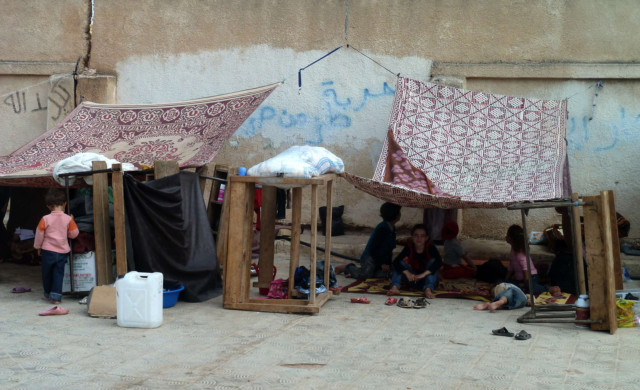
Atme, Syria: Prisoners of their homeland’s conflict, Syrian refugees have been crammed for weeks in shelters in a border village just metres away from the Turkish border waiting for a green light to cross.
In and around rebel-controlled Atme in northern Syria, thousands are stranded in schools and tents hoping to join refugees living for the past year in camps on the Turkish side of the border.
Forgotten by both Syrian and international aid organisations, they rely on the generosity of local families and volunteers.
Ahmed Najjar, who worked as a builder in Al Dana, 40 kilometres (25 miles) from Atma, had stay cloistered in his home with his family for a month before witnessing the death of a neighbour as the shells landed closer.
He decided to pack a few carpets and blankets and fled towards Turkey, already home to some 83,000 registered refugees and which has said it can handle no more than 100,000 refugees.
“It’s been 31 days since we came here,” said the 41-year-old as he heated water on a wood fire. “Everyday they tell us ‘tomorrow, tomorrow’, and we never enter Turkey.”
“The nights have become cold, the children are getting sick. How long will we stay here?”
Turkish soldiers, deployed on a hilltop post, partially open the gates for a limited number of refugees, based on their country’s capacity which has reached its limit pending the construction of new camps.
Some days, the soldiers call over 20 people, check their IDs and ferry them away in trucks. Sometimes, it can be several hundreds.
“You never know in advance,” said Ihab, a 28-year-old mathematics teacher in charge of securing food supplies for the refugees.
“When they let many families in, the news spreads and people begin flocking into the area from different places, all of whom need to be fed.”
At least it’s quiet here:
Villagers welcome friends and relatives as the number of people in every house grows to as many as 20 or 30, crowded together. A tent camp for around 500 people is planned in Atme.
Nearly 200 families are packed into a school where classrooms have been emptied for women and children to shelter, while the men sleep in the yard.
In the kitchen, four large stoves are used to cook rice in giant pots. Water, cut off for the past two months, is drawn from wells and stored in tanks for use whenever electricity is available for pumping — which is not often.
During the early months of the conflict, refugees did not stay long in Atme as they were able to cross to Turkey easily, said one young local man. “But since Turkey stopped taking in large numbers, they’ve become dependent on us.”
“If we knew anyone in Turkey, we would have gone there secretly,” said 45-year-old Omar, who has camped for over a month under a tent made of a carpet stretched between two desks.
“But this isn’t the case. And the truck that drove us here cost us all the money we had.”
Samiha, a 42-year-old mother, was alone with her seven children, among them two veiled teenage girls who turned their heads to any stranger.
“If the Turks let us in, we would remain there until the fall of the regime which bombs and kills us,” said Samiha.
“Our village, Daret Azzeh, was hit by rockets, bombs, and planes. I didn’t know how to calm the children. At least it’s quiet here.”
Thousands have fled to Turkey since fierce fighting erupted in Syria’s commercial capital Aleppo in mid-July between rebels and President Bashar Al Assad’s troops.
More than 30,000 people, most of them civilians, have been killed in violence since the outbreak of the revolt against Assad in March 2011, according to the Syrian Observatory for Human Rights.











